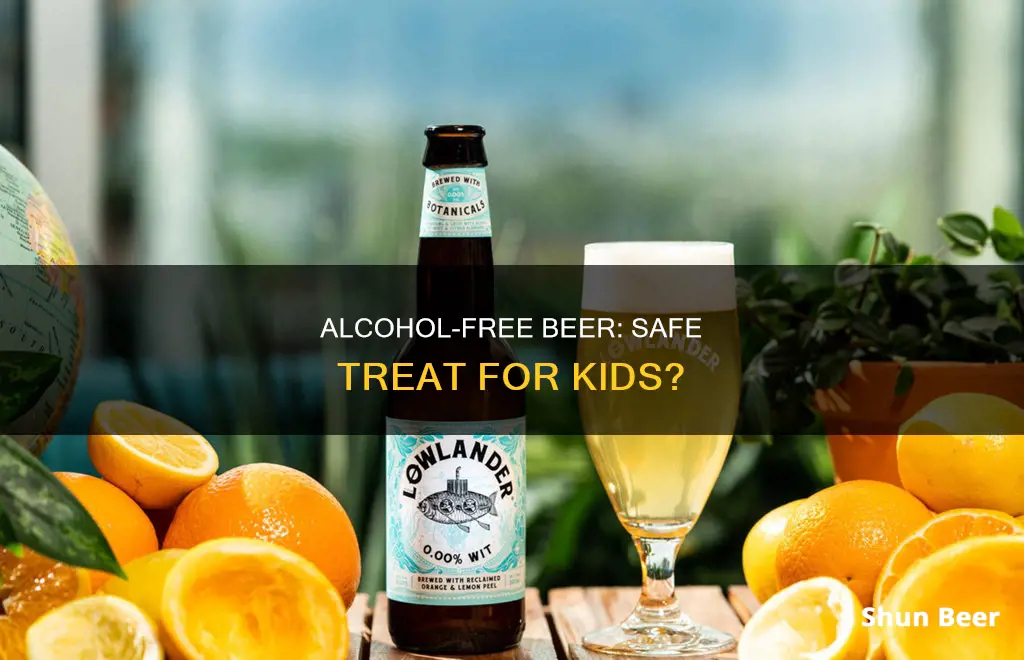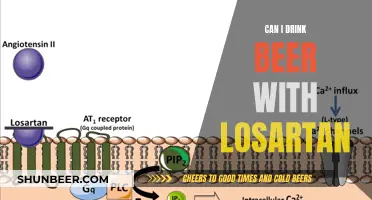
Alcohol-free beer has become a topic of debate among parents and pub owners alike. While some parents allow their children to drink non-alcoholic beer, others are concerned about the potential risks. Legally, minors can purchase alcohol-free beer in the UK, as it is not classified as alcohol under the Licensing Act 2003. However, some pubs have chosen to implement their own policies, restricting the sale of these drinks to individuals under the age of 18. The question of whether kids should be allowed to drink alcohol-free beer remains divisive, with some arguing that it could increase their interest in alcohol and others suggesting that it could help them develop a healthier relationship with it.
What You'll Learn

Alcohol-free beer may increase the risk of addiction
Alcohol-free beer is often marketed as a safe alternative to regular beer, but it is important to consider its potential risks, especially for certain vulnerable populations. While it may seem like a harmless option, alcohol-free beer can pose dangers, particularly for individuals vulnerable to addiction or with a history of alcohol use problems.
The Presence of Alcohol
Firstly, it is important to understand that alcohol-free beer is not always completely free of alcohol. By law, non-alcoholic beers can contain up to 0.5% alcohol by volume (ABV). While this amount is negligible, it is still alcohol, and it can be triggering for individuals vulnerable to addiction. Additionally, research suggests that many non-alcoholic beers contain higher levels of alcohol than indicated on their labels. This discrepancy can be dangerous, especially for those trying to abstain from alcohol.
Triggers and Cravings
The smell, taste, and context associated with drinking beer can trigger cravings and emotional associations for individuals with a history of alcohol addiction. The act of consuming a beverage that resembles beer can trigger a placebo response, leading to sensations and emotions similar to those associated with alcohol consumption. This can be a powerful trigger for those in recovery, potentially leading to a relapse. The beer-drinking routine, the taste, and the social context can all contribute to a psychological addiction, even without the effects of alcohol.
Normalizing Alcohol Consumption
Alcohol-free beer can also serve as a "gateway" or normalizing agent for alcohol consumption, especially for young people. By imitating the flavour, packaging, and appearance of alcoholic products, alcohol-free drinks could condition individuals, especially children and teenagers, to view alcohol consumption as desirable and acceptable. This could increase their interest in alcohol and potentially lead to riskier drinking patterns in the future.
Recommendations
The potential risks of alcohol-free beer underscore the importance of informed decision-making. While it may be a suitable option for some, it is crucial to consider individual circumstances, triggers, and vulnerabilities. For those in recovery from alcohol addiction, it is advisable to consult with healthcare professionals or support groups before consuming alcohol-free beer. Additionally, parents should carefully consider the potential implications of allowing their children to consume these beverages, as it could inadvertently encourage an interest in alcohol.
Breastfeeding and Beer: Is One Drink Okay for Baby?
You may want to see also

No legislation stops minors from consuming non-alcoholic drinks
While opinions vary on whether kids should drink non-alcoholic beer, the fact remains that there is no legislation prohibiting minors from consuming non-alcoholic drinks. The Licensing Act of 2003 defines "alcohol" as beer, wine, cider, spirits, and other liquors with an ABV of over 0.5%. This means that non-alcoholic drinks, which typically have an ABV of 0.5% or less, are not legally considered alcohol. As such, there are no specific laws restricting their sale or consumption by minors.
This lack of legislation has sparked debate among parents, experts, and businesses. Some parents, like actress Kristen Bell, allow their children to drink non-alcoholic beer, arguing that it holds special meaning for their family and is no different from consuming a ripe banana or a glass of orange juice, which contain similar amounts of alcohol. Other parents, however, worry that these drinks could serve as a "gateway" to risky alcohol consumption in the future, normalizing alcohol use and making it more appealing to minors.
Businesses have also expressed mixed reactions to the issue. While some pubs and restaurants allow minors to purchase non-alcoholic drinks, others have banned these sales, citing concerns about blurring the lines between alcoholic and non-alcoholic beverages. They argue that non-alcoholic drinks are often designed to imitate the look and taste of their alcoholic counterparts, making it difficult for staff to distinguish between the two once served. Additionally, some companies choose to implement age verification policies for all low and non-alcoholic drinks as a precautionary measure, even though it is not a legal requirement.
Despite the absence of specific laws, it is worth noting that the Alcohol and Drug Foundation has advocated for subjecting zero-alcohol beverages to the same regulations as full-strength products. They argue that these drinks could condition young people to consume alcohol in the long term and potentially increase their risk of developing substance use disorders, especially if there is a genetic predisposition. However, others emphasize the importance of family bonding and open discussions about alcohol and addiction, which can be protective factors against future substance misuse.
Drinking Beer While Taking Allegra: Is It Safe?
You may want to see also

Alcohol-free beer may normalise alcohol consumption
Alcohol-free beer, by definition, contains little to no alcohol. However, some products may contain up to 0.5% alcohol by volume (ABV). This means that alcohol is still present in these beverages, even if in small quantities.
The potential dangers of alcohol-free beer lie in its ability to serve as a gateway to alcohol consumption, especially in young people. The Alcohol and Drug Foundation has called for alcohol-free beverages to be regulated similarly to full-strength alcoholic products. This is because these drinks could condition young people to view alcohol consumption as normal and acceptable.
Research supports this claim, suggesting that alcohol-free drinks may increase the likelihood of young people consuming alcohol as they age. One study found that the supply of alcohol by parents to adolescents doubled the risk of binge drinking in the following year. Another study found that the desire to drink alcohol increased after consuming alcohol-free drinks, with the increase being more significant in individuals with alcohol dependence.
Furthermore, the smell of alcohol-free beer may be enough to trigger cravings and a subsequent relapse in individuals recovering from alcohol use disorder. The context of drinking alcohol-free beer, such as drinking with adults, may also contribute to normalising alcohol consumption for children and teenagers.
While the potential risks of alcohol-free beer for minors should be carefully considered, it is important to note that the existing research is limited, and more studies are needed to fully understand the impact of these beverages on young people.
Mixing Beer and Wine: What's the Harm?
You may want to see also

Alcohol-free beer may contain trace amounts of alcohol
Alcohol-free beer is often assumed to be completely devoid of alcohol, but this is not always the case. In the United States, beverages labelled as "non-alcoholic" can contain up to 0.5% alcohol by volume (ABV). This threshold is similar to the alcohol content found in certain fruit juices, breads, and ripe bananas. While it is not enough alcohol to cause intoxication or a hangover, it is still a trace amount.
The presence of alcohol in alcohol-free beer is a result of the brewing process. Brewers start with basic ingredients such as water, yeast, hops, and grain, and employ fermentation processes similar to those used for conventional beer. The key difference lies in the type of fermentation used to remove alcohol from the final product. Controlled fermentation methods are the most common approach, where the fermentation process is halted prematurely to limit the ABV. Despite these measures, trace amounts of alcohol may still remain in the beverage.
Additionally, some brewers utilise dealcoholization methods to remove alcohol from the brew. This can be achieved by heating the alcohol to its boiling point, diluting the product with water, or employing vacuum distillation. These techniques mirror those used in dealcoholized wine production. However, even with these methods, it is challenging to eliminate all traces of alcohol.
The perception that alcohol-free beer is not as popular as regular beer may be influenced by the belief that it doesn't taste as good. The presence of trace amounts of alcohol in these beverages could be a contributing factor to the taste profile. Furthermore, the lack of standardisation in labelling requirements for alcohol-free beer across countries can make it challenging for consumers to make informed choices.
While the amount of alcohol in alcohol-free beer is negligible, it is important to recognise that it is not entirely absent. This information is particularly relevant for individuals who wish to avoid alcohol for health, religious, or personal reasons. It is always advisable to read labels carefully and make informed choices based on individual preferences and requirements.
Beer and Theraflu: A Safe Mix?
You may want to see also

Alcohol-free beer may be unhealthy for children
Firstly, alcohol-free beer can normalise alcohol consumption and influence children to want to try the "real thing". Dr Amy Pennay, a senior research fellow, states that there is evidence from tobacco research that underage e-cigarette use is a gateway to adult nicotine and tobacco use. Similarly, non-alcoholic beer could serve as a "gateway", increasing children's proclivity to drink alcohol as they age. Professor Tim Slade from The Matilda Centre for Research in Mental Health and Substance Use supports this idea, suggesting that drinking non-alcoholic beers that resemble regular beers may set children up for risky alcohol consumption in the future.
Secondly, alcohol-free beer could increase the risk of addiction, especially if there is a genetic predisposition. Dr Marc Auerbach, a pediatric emergency medicine specialist, explains that both genetic and environmental factors play a role in the development of substance use disorder. Introducing the ritual of drinking beer, even if it is non-alcoholic, can be risky for children who may have a genetic predisposition to substance misuse. Normalising alcohol use may increase their risk of developing an addiction.
Thirdly, alcohol-free beer contains calories and carbohydrates, similar to sodas and other sugary drinks. While it may not have an immediate impact on children's health, Dr Bruce Tasios, an orthodontist, advises against giving these drinks to children as they are not the best choices for physical health.
Lastly, some alcohol-free drinks can contain trace amounts of alcohol, up to 0.5% ABV. While this amount is not considered intoxicating for adults, there is a risk of blurring the lines for children regarding what is acceptable to consume. Some pubs and restaurants have even banned the sale of alcohol-free drinks to minors to avoid any potential risks or confusion among staff and customers.
In conclusion, while alcohol-free beer may not be explicitly illegal for children to consume, there are valid concerns about its potential impact on their health and development. It is essential for parents and guardians to make informed decisions regarding their children's exposure to these beverages, considering the potential risks and long-term consequences.
Beer and Fluconazole: Is It Safe to Mix?
You may want to see also
Frequently asked questions
No, alcohol-free beer can contain up to 0.5% ABV.
There is no legislation around minors buying or consuming non-alcoholic alternatives. However, some pubs choose not to serve alcohol-free beer to minors.
Pediatricians say there are physical health risks when it comes to kids drinking these beers. Even non-alcoholic beer could increase the risk of addiction, and normalise drinking.
Parents have mixed feelings. Some are concerned that it could influence their children to want alcoholic drinks, while others are happy for their teens to try alcohol-free alternatives.







